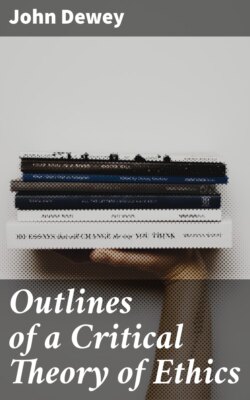Читать книгу Outlines of a Critical Theory of Ethics - Джон Дьюи - Страница 21
На сайте Литреса книга снята с продажи.
XV.
ОглавлениеSummary.
The truth in hedonism is its conviction that the good, the end of man, is not to be found in any outward object, but only in what comes home to man in his own conscious experience. The error is in reducing this experience to mere having, to bare feelings or affections, eliminating the element of doing. It is this doing which satisfies man, and it is this which involves as its content (as knowledge of impulse, instead of blind impulse) objective and permanent ends. When Mill speaks of the end of desire as a "satisfied life," (p. 317 of Utilitarianism) he carries our assent; but to reduce this satisfied life to feelings of pleasure, and absence of pains, is to destroy the life and hence the satisfaction. As Mill recognizes, a life bounded by the agent's own feelings would be, as of course, a life "centred in his own miserable individuality." (Mill, p. 319). Such words have meaning only because they suggest the contrast with activity in which are comprehended, as 'ends' or 'objects' (that is, as part of its defined content) things—art, science and industry—and persons (see Secs. 34 and 35).
Here too we must 'back to Aristotle.' According to him the end of conduct is eudaimonia, success, welfare, satisfied life. But eudaimonia is found not in pleasure, but in the fulfillment of human powers and functions, in which fulfillment, since it is fulfillment, pleasure is had. (Ethics, Bk. I, ch. 4-8).
We now take up the question whether pleasure is a standard of right action, having finished the discussion concerning it as an end of desire.
